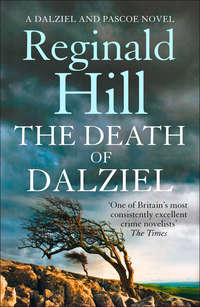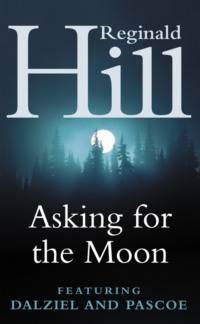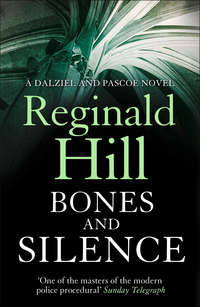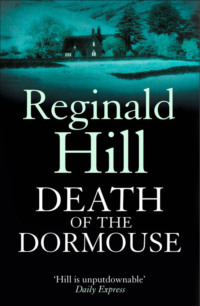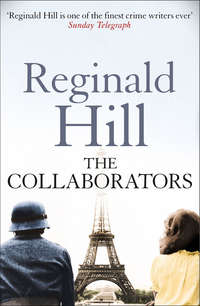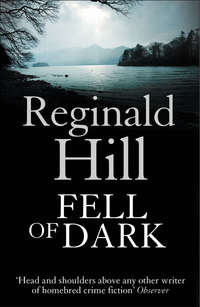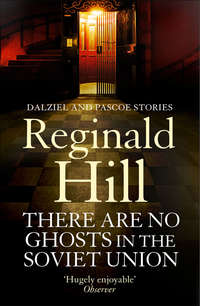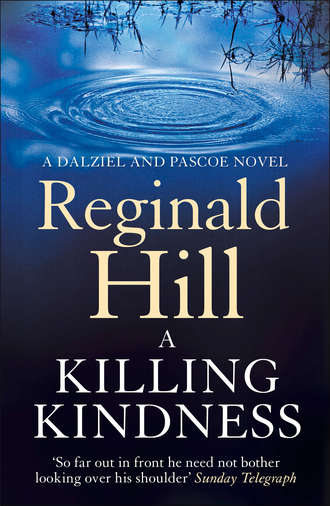
Полная версия
A Killing Kindness
Pascoe sighed. The bloody pathologist thought he was having things difficult!
Sergeant Wield came in.
‘I just had CRO run some of those fairground people through the computer,’ he announced.
‘Including Miss Stanhope?’ said Pascoe with a grin.
Wield’s creased and pitted face had shown no response to Pascoe’s twitting about Pauline Stanhope’s interest earlier that day. Now he managed something not unlike a grimace.
‘There was a statement from her and her aunt,’ he said. ‘Like all the rest. Nothing. This was interesting, though.’
David Lee had been in the hands of the police several times. Disorderly conduct had cost him half a dozen fines. In 1974 he had been put on probation for assault on his common law wife. Assaulting a council officer in charge of an operation to move on a gypsy encampment got him three months in 1976, and this had been doubled in 1978 when he punched a police officer who was attempting to stop him from beating another common law wife.
There was also a charge of rape in 1979, dismissed by a majority verdict.
‘What made you pick on this one?’ wondered Pascoe. ‘Not because I saw him chatting up Miss Pauline, I hope?’
‘There’s half a dozen others,’ grunted Wield. ‘If you’d care to have a look.’
Pascoe thought for a moment.
‘Tell you what,’ he said. ‘If Mrs Sorby’s such an enthusiast for peering over the Great Divide, perhaps Brenda got roped in too.’
‘And might have known about the Madame Rashid connection,’ said Wield.
‘And met Dave Lee through it?’
Pascoe shook his head even as he spoke.
‘It’s stretching things a bit,’ he said. ‘Still, it’s worth checking. Fancy a trip to the fairground to have your fortune told?’
Wield shrugged.
‘I go where I’m sent,’ he said indifferently.
‘All right,’ said Pascoe. ‘It’s twelve now. Have your lunch, then with your vigour fully restored go and cross the lady’s palm with silver. Either lady, depending whether you prefer mutton or lamb.’
I must stop this nudge-nudge, wink-wink bit, he thought as Wield left. I’m getting more like Dalziel every day!
A few moments later the phone rang. It was the desk sergeant.
‘There’s a lady here wants a word with someone in CID, sir,’ he said. ‘It’s a Mrs Rosetta Stanhope.’
‘What? Oh, look, Sergeant Wield probably wants to speak with her anyway, so let him sort it out, will you? He should be on his way out any moment now.’
‘He just went past, sir. I don’t think he noticed the lady. He seemed in a bit of a hurry.’
‘The bastard!’ swore Pascoe. ‘He’s opted for lamb. All right. Wheel her in.’
Rosetta Stanhope had adapted well to her chosen environment. In her late fifties, her hair tightly permed with just the suggestion of a blue rinse, dressed in a stylishly cut grey suit with toning shoes and handbag, she could have chaired a WI meeting or opened a flower show without remark. Only a certain rather exotic stateliness of bearing and darkness of skin which even a carefully layered mask of make-up could not disguise hinted at her origins.
Her voice was quiet, a little hoarse, perhaps; the result of twisting her vocal cords to produce her spirit voices? wondered Pascoe.
‘I met your niece this morning,’ said Pascoe. ‘You haven’t seen her?’
The woman considered, then smiled.
‘You’re quite right, Mr Pascoe. I wouldn’t do Madame Rashid dressed like this. And I wouldn’t go home specially to change just to impress a policeman.’
Pascoe was impressed. She’d cut right to the source of his question. Not that you needed to be a mind-reader, but it was a good policeman’s trick.
‘So you’ve left your niece in charge of the future?’
Lucky old Wield.
‘I didn’t feel able today,’ she said. ‘I don’t put on a show. It’s got to be right.’
‘What about Pauline?’
Mrs Stanhope made an entirely un-English moue of dismissal.
‘Palmistry,’ she said. ‘It’s a craft. You learn it.’
Pascoe decided to do a bit of short-cutting himself.
‘I’m afraid you’re not going to be able to get an apology out of us, Mrs Stanhope. It wasn’t our doing. A denial perhaps, but I tried that yesterday and you saw the report. I’m sorry it upset you.’
‘I’m not upset, Inspector,’ she said. ‘Don’t heed our Pauline. She probably told you I’m not very practical? Well, I’m practical enough to let her think so. She needs to be looking after folks, that one. It probably comes of never knowing her mother.’
‘You brought her up from birth, I believe,’ said Pascoe. ‘I’m surprised she doesn’t regard you as her mother.’
‘She did when she was young, poor mite. But she had to be told. I remember she was twelve and casting her own horoscope. It wouldn’t come right. Well, it wouldn’t, would it? Bert and me had always decided to tell her. It was a relief in a way.’
‘Why so?’
‘She knew about me and my background. I’m proud of it, why not? And Bert always used to joke that he’d stolen me from the gypsies. Pauline and me, we got very close, but I could see it was a bit difficult for a young lass thinking she’d got a gypsy mother but not feeling of the blood, if you follow. It were odd, but when we told her, it seemed to bring us even closer together.’
‘And finally she joined that side of the family business?’
‘She could hardly become an engine-driver, could she, even in this age,’ said Rosetta Stanhope lightly.
‘I believe it’s possible,’ said Pascoe, suddenly picturing Thelma Lacewing wiping her brow with an oily rag on the footplate of the ‘Flying Scotsman’. ‘But tell me, Mrs Stanhope, if you’re not here to complain, threaten, or cast a gypsy’s curse, why have you come?’
She leaned forward and tapped his desk significantly. Or perhaps she was knocking on wood?
‘I was upset last night, Inspector. Not by the paper, though that irritated me. I was upset by the contact I’d made with that poor girl. I hardly slept. I just kept on getting impressions; no, not visions or words, nothing definite like that; but, like colours and feelings. I let Pauline think it was just the newspaper report that had upset me. I wanted to think things out for myself.’
‘So what do you want, Mrs Stanhope?’
She opened her youthfully clear brown eyes in big surprise.
‘I want to do what that Evening Post said I was doing already,’ she said. ‘I’ve come to help you with your enquiries.’
Chapter 6
When Sergeant Wield reached Charter Park the fairground was doing good business. It was a fine sunny day with just enough breeze to cool a fevered brow and send little puffs of cloud, picturesque to the point of artificiality, drifting across the deep blue cyclorama above. The green of the grass and trees, the sparkling band of the river, the bright brash music of the steam organ, all these combined to produce a pleasantly euphoric sensation in the sergeant’s breast which he allowed to surface in the form of a light almost soundless whistle through gently pursed lips.
His reaction when he reached the fortune-teller’s tent and found the flap closed and a folding chair pushed against it to which was pinned a card saying BACK SOON was disappointment, but it was a purely professional emotion. Pascoe’s winks and nods about Pauline Stanhope’s fancy for him were seeds on the stoniest of ground. Wield’s self-containment and reticence were not linked, as the amateur psychologist might have guessed, to his fearsome appearance. They derived from his early recognition that the best way to conceal one thing was to conceal all things, to have so many secrets that the only important one would not be suspected. And this was that he was wholly and uncompromisingly homosexual. In the police, the usual circular syndrome applied. Homosexuals were disapproved of because they were blackmail risks because they were secretive because they were disapproved of …
Ten years earlier Wield had found himself growing increasingly fond of a man called Maurice Eaton, a Post Office executive who was even more anxious than Wield about the damage an open liaison might do to his career. But they had reached the stage of discussing setting up house together in Yorkshire when Eaton was offered a promotion in the North-East. To Wield, the move had seemed tragic at the time, but soon a routine of weekends in Newcastle and holidays abroad had been established which, while it was not without its tensions and dangers, had proved viable for a decade. But though having the centre of his emotional life a hundred miles away had made him ‘safe’, it also made him a bit of a cypher. Institutions do not like what they do not understand and now he was stuck at sergeant with younger men like Pascoe leapfrogging over his head.
Eventually something would give, he felt it in his bones. Meanwhile, on with the job.
The stall closest to the fortune-telling tent was an old fashioned ‘penny-roll’ at which coins were rolled down grooved ramps to land on a numbered chequer board, winning the amount stated if the coin fell plumb in the middle of a square. The man in charge shrugged indifferently, but his sharp-featured helpmeet believed she had seen Pauline leave about twenty minutes earlier. So BACK SOON could mean an hour or so yet.
He ought to get back to the station. He felt a little guilty at the way he had turned a blind eye to Rosetta Stanhope as he left, but it had seemed amusing to reinforce Pascoe’s impression that he was more concerned with the good-looking niece than the old aunt. But it was very pleasant being out in the sunshine and he found himself asking the penny-roll woman if she knew where he might find Dave Lee.
She gave him a sharp, inquisitive look, then said, ‘He could be on the dodgems, or the waltzer. He helps around when they’re busy.’
‘He doesn’t have anything of his own then? A stall, I mean?’
The woman answered sneeringly, ‘He’s pure didicoi, not real fair people, don’t like regular work, them. There is a stall, a lot of gypsy tat if you ask me. Over there, by the river. You’re a copper, aren’t you?’
‘No, I’m his rich uncle from Australia,’ said Wield gravely.
The dodgems and the waltzer producing no sign of Lee, he made his way to the stall which did nothing to make him feel the penny-roll woman had been unjust. Even in this temple of tawdriness, this looked extra tawdry and the dark-skinned woman with high, aristocratic cheekbones, one of which was livid with a wide bruise, seemed to be making little effort to entice customers.
‘I’m looking for Dave Lee,’ said Wield.
‘What for? Are you going to arrest the bastard?’ she answered.
‘Just talk.’
‘Pity. Why not put him in jail for a while?’
She seemed sincere.
‘Why? What’s he done?’
‘Him? What hasn’t he?’
Suddenly she seemed to tire of the conversation as if even resentment and hatred could not stimulate her interest for long.
‘He’s not here,’ she said flatly.
‘Where might he be?’
She shrugged. Wield consulted his notebook.
‘You don’t have a trailer here, do you? Could he have gone back to the encampment?’
Another shrug. Wield’s patience began to go.
‘All right. Come on.’
‘Come on where?’
‘To the station.’
‘Me? What have I done?’
The interest had been restimulated.
‘You? What haven’t you?’ mimicked Wield.
She swore. He didn’t understand Romany, but he had no doubt what she was calling him.
‘He went in the van,’ she said, gesticulating at the nearby trailer park. ‘Half an hour. To the camp, perhaps. Does he tell me where he goes? If you see him tell him he can …’
‘What?’ asked Wield.
The woman’s face went sullen, flat, once more. Only the bruise gleamed.
‘Nothing,’ she said.
Wield strolled down to the river’s edge. Boats were in large demand and the isthmus was full of people. For two days as a couple of dozen coppers crawled on their hands and knees from one end to the other, it had been closed to the public. The only result had been the most efficient litter-clearing operation in the city’s history. Now the picnickers were back, their appetites doubtless whetted by the thought that on this very spot perhaps a girl had been done to death. And if they got bored with that, they could stroll a hundred yards or so down the canal bank and peer greedily across at the blank wall of Spinks’ Electrical Depository where earlier the same night a watchman had had his skull fractured for the sake of a few cheap transistor radios made in Hong Kong.
Though typically he kept them to himself, Wield had his own carefully worked out ideas about crime and punishment. They included doling out in exactly measured and scientifically monitored doses the kind of pain to the attacker which he had inflicted on the attacked. Nothing to do with barbarities like chopping off hands or cutting off ears. Just the pain.
Though how to measure the pain of terror which these murdered women must have felt, he did not know. But something was needed, something better than we had.
He went back to Madame Rashid’s tent. The notice was still there. He glanced at his watch. One-thirty. The station? Or could he justify going after Dave Lee? It was just a fifteen-minute drive at the most.
‘Sod it,’ he said and headed for his car.
He drove rapidly and efficiently, roughly following the course of the river out of town till he reached the old airfield which lay to the southeast. There had been a time in the affluent days of Super-Mac at the end of the ’fifties when it had teetered on the edge of development into a full-scale airport. But the moment had passed and now it was two-thirds disused, the remaining one-third being in the hands of the local Aero Club. Occasionally small private planes landed, particularly when there was a big race meeting at the city track, but generally speaking only the breathless swoosh of the gliders disturbed the air. There were a couple up now. Wield watched them, admired their soaring freedom but felt no desire to share it. He was a motor-bike man himself. Black leather and 100 mph up the motorway. Something else he kept quiet about at the station.
The disused section of the airport, where the urgent weeds and grasses had turned the runway into crazy paving and a couple of derelict buildings gaped like dead mouths at the unremembering sky, was now the site of an unofficial/official gypsy encampment.
It was ‘unofficial’ because the local council had been arguing for years about the need to provide an official site in the area; it was ‘official’ because during the hard months of the winter and during the two weeks of the High Fair the council and the police operated a ‘no-hassle’ policy. But come the spring and come the end of fair fortnight, the stand-pipes were turned off and the travelling folk invited to travel. There was a strong lobby in the gliding club which wanted them cleared off permanently, claiming that apart from polluting the nearby river with their sewage, their ponies (the same which had been banned from Charter Park) were a menace to gliders and small aircraft landing only a quarter-mile away. The council had erected a picket fence to prevent the ponies from straying but this was not proving one hundred per cent effective, as Wield realized when he got out of his car close to the gaudily painted caravans.
Normally the arrival of a stranger would have been viewed with close suspicious interest, but at this moment all attention was focused on a noisy and potentially violent confrontation taking place in the middle of the caravan circle.
On the one side was a group of gypsies with Dave Lee at their head. On the other were two men, one slight, blond, wirily built, in slacks and a sports shirt, the other much bulkier and sweating in a thick windcheater and flying helmet. All around them at a discreet distance stood a circle of interested women and kids.
The heavier man was wagging a finger that wouldn’t take much bending to make a fist in Lee’s face.
‘Listen, you,’ he grated in a harsh Yorkshire accent, ‘I see one more bloody pony on the Aero Club’s ground and I’ll shoot it, you hear? And then I’ll come and shoot the bugger who owns it.’
Dave Lee bared brown-stained teeth in a sneer and answered in an unpunctuated and rather high-pitched gabble. ‘Listen mister what’s up here you come here fucking threatening and talking about some pony which pony show us the fucking pony and what do you think anyway that ponies have no fucking sense to get out of the way of those machines more fucking sense than some fucking idiots who go up in them!’
The wagging finger folded. Wield had recognized the face beneath the flying helmet. It was Bernard Middlefield, JP. Not a man he cared for, but not a bad magistrate from a police point of view. At least he jumped hard on first offenders, believed police evidence like Holy Writ, and started from the useful premise that ninety per cent of what most social workers said was crap.
It would be interesting but not diplomatic to witness him thumping the gypsy. The blond man seemed bent on acting as a peacemaker but there was no guarantee of his success.
Wield advanced, warrant card at the ready, and addressed himself to Lee.
‘Mr Lee?’ he said. ‘Can I have a word?’
The big gypsy laughed scornfully and said in the direction of Middlefield, ‘No wonder he wants to fight when already he’s called the cops!’
‘Are you the police?’ said Middlefield. ‘Just in the nick!’
Wield didn’t want to get involved but he had to hear the tale. The blond man was Austin Greenall, Chief Flying Instructor of the Aero Club. He had been manning the launching winch to get Middlefield’s glider airborne when a pony had come wandering across the path of the accelerating aircraft and nearly caused an accident. Middlefield had come straight to the gypsy encampment closely attended by the secretary.
‘Ultimately it’s the council that are responsible, sir,’ said Wield. ‘They own all this land. You lease from them, I believe? So keeping fences in repair is their job.’
‘Thanks for nothing,’ said Middlefield. ‘If I’d got killed, you might have taken heed, is that it? Well, I’ll tell you something, these buggers need sorting out, and I’m the man to do it. They’re anti-social, dirty and dishonest. I’ve got my works on the estate not a quarter-mile from here. When this site’s occupied, I double my security staff. Double it. And that costs brass!’
‘I’m sorry, sir,’ said Wield. ‘Unless there’s been a breach of the law …’
Middlefield snorted indignantly, turned on his heel and marched away. Greenall gave an apologetic shrug to Wield, said, ‘For God’s sake, Mr Lee, watch those animals of yours,’ and went after him.
‘Yorkshiremen!’ said Lee. ‘Tough buggers, they think. Always wanting to fight.’
‘Not me,’ said Wield. ‘I want to talk.’
They went to sit in the sergeant’s car. Gypsies don’t invite strangers, especially policemen, readily into their caravans and though the day was balmy, Wield knew that if he talked with Lee out of doors, he would quickly inherit the circle of curious kids.
Away from the excitement of confrontation, the gypsy’s torrential speaking style declined to a reluctant dribble.
‘It’s about last Thursday night,’ said Wield.
‘I’ve told all that.’
‘I read what you said,’ said Wield.
‘Well then.’
‘You said you were at the Fair from eight till eleven, mainly on the dodgems.’
‘Yes.’
‘And you didn’t see anyone resembling the dead girl during that time.’
‘That’s right.’
‘You don’t sleep at Charter Park, do you?’
‘No. They stopped the ponies a few years back. Said they were dangerous. Like that short-arse fool.’
‘So you came back here to your caravan at night. How?’
‘I’ve a van. That’s it there. Licensed and insured.’
‘I never suggested it wasn’t,’ said Wield. ‘But I’ll check. I’ve done a lot of checking on you already, Mr Lee.’
‘So?’
‘So I know all about you. You’ve a nasty temper.’
The man shrugged.
‘Against women too. I saw a woman today at your stall. She’d had a nasty crack.’
‘She’s a clumsy bitch.’
‘Yes. Rape too. You’ve not stopped short of that, have you?’
This at last restarted the torrent of words, but not English. Wield said finally, ‘Shut up or I’ll pull your balls off.’
The man subsided, then burst out again. ‘There wasn’t no rape! No conviction! Rape that slut? Stick feathers on a chicken!’
‘All right, all right,’ said Wield impatiently. ‘Where was your van parked?’
‘Behind the stall,’ he answered sullenly.
‘And you just drove back here? Straight back? At eleven?’
‘Eleven, half past. I don’t know. It started raining. We packed the stuff from the stall into the van like every night.’
‘We?’
‘My wife and me. You met her you said. Then back here.’
‘And no doubt she’ll confirm this? And that you then went to bed and slept peacefully all night?’
The man didn’t bother to answer.
‘All right,’ said Wield. ‘Now tell me about Madame Rashid.’
He had a sense at that moment of the gypsy’s receptivity being turned up a notch, though there was no outer physical sign.
‘You know her?’
‘Yes.’
‘In fact she’s a relation of yours, isn’t that so?’
‘She married a gorgio,’ he said. ‘Many years ago.’
‘And her niece. You know her too?’
‘I see her at the park.’
Wield paused. He’d no idea why he’d introduced this line of questioning. It wasn’t going anywhere.
He decided on the heavily significant abrupt conclusion.
‘All right,’ he said. ‘That’s it.’
‘What?’
‘Out.’
The big gypsy got out of the car and shut the door with a force that shook Wield. An older grey-haired man with a ruddy open face who had been hanging around close by approached Lee and exchanged words with him in rapid Romany. Wield leaned out of his window and beckoned to the newcomer.
‘Who’re you?’ he demanded.
‘Me, pal? I’m Silvester. Silvester Herne’s my name, pal.’
‘Are you the boss of this lot? The king or whatever you call it?’
‘Me, pal?’ he said again, looking amazed. ‘Just an old gypsy, just old Silvester.’
‘Well, old Silvester, see if you can get it into your friend’s thick skull. I’m not happy about him. I’ll be back. Meanwhile, get that fence mended, stop them ponies straying. Or you’ll all be in trouble. Right?’
‘Right, pal,’ said Herne, beaming co-operation. ‘Straightaway!’
That was telling them! thought Wield as he drove away, but years of experience had taught him that telling gypsies anything was like talking to the trees. Not that he objected to gypsies as such, though the untidiness of their life made him shudder. If anything, he felt a sneaking sympathy with them as outcasts and envy of them as defiant outcasts. And perhaps there was some atavistic fear in his attitude also. He had certainly been more affected by Rosetta Stanhope’s trance yesterday than he cared to reveal.
He should have gone back to the station but instead he found himself driving to his own flat, where he made himself a cup of tea. It was a gloomy place, he thought dejectedly. Even on the brightest of days the small north-facing windows let little light in. And it was drab and impersonal. Not many people visited him here apart from his married sister and the young nephew whose cassette recorder he had used at the seance. But the secretive element in his make-up drew him to the anonymous and noncommittal in all but the most private areas of life.
Reacting against the thought, he picked up his phone and dialled Maurice’s business number in Newcastle. But when the phone was answered he replaced it without speaking. They had an agreement. All contact to be private except in extreme emergency. This was no emergency though somehow it felt as if there might be an emergency in the offing, like an area of low pressure over the Atlantic on the telly weather chart.


